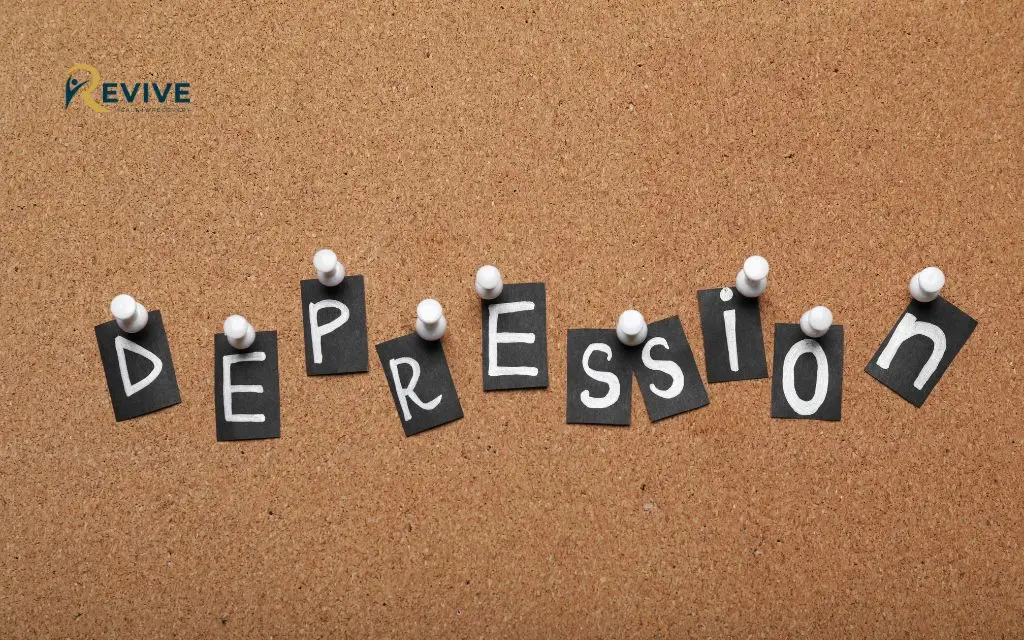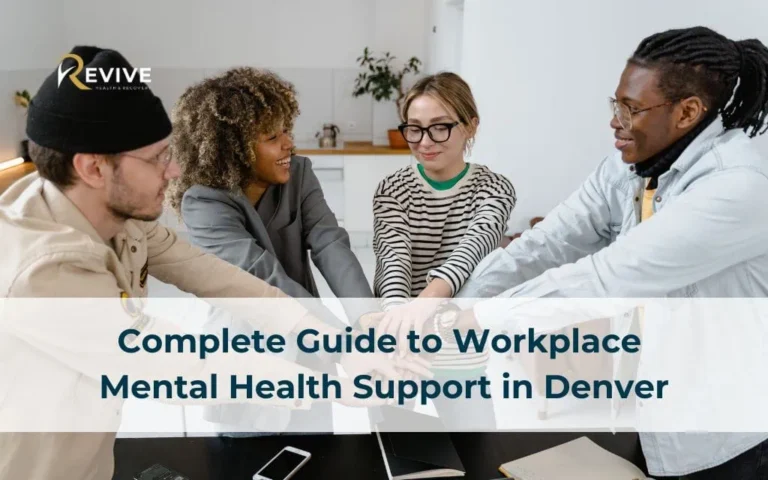Despite the rising awareness of mental health issues, men are still less likely to seek help or openly discuss their struggles, leading to higher rates of suicide, substance abuse, and untreated mental health conditions. The stigma surrounding men’s mental health continues to persist, and it’s one of the key factors contributing to the growing mental health crisis among men.
Every June, Men’s Mental Health Month provides an important opportunity to raise awareness, share resources, and start important conversations about mental health in men. Yet, despite its significance, why is Men’s Mental Health Month ignored by many?
In this post, Revive Health Recovery will explore the reasons behind the lack of attention to this important health topic and discuss why it’s crucial that we give men’s mental health the focus and support it deserves.
The Worldwide Statistics: Why Is Men’s Mental Health Month Ignored?
Mental health is an important part of our overall well-being, but it’s often misunderstood and not talked about enough, especially when it comes to men. For years, society has told men to hide their feelings, toughen up, and push through tough times. This has made it harder to understand the unique mental health needs of men and has led to higher rates of suicide, substance abuse, and other mental health problems.
Worrying facts about men’s mental health:
- Men are more likely to die by suicide than women. In fact, men make up almost 75% of all suicide deaths in the U.S.
- Men are also less likely to ask for help with their mental health. A survey by the American Psychological Association found that only 35% of men would reach out to a mental health professional, compared to 58% of women.
- Many mental health problems impact men more than women. For example, men are more likely to have alcohol dependence or antisocial personality disorder, while women are more likely to struggle with depression and anxiety.
- Men also face more work-related stress. A study by the American Institute of Stress showed that men often feel more overwhelmed at work, but they’re less likely to take time off to focus on their mental health.
- To cope with stress, men are more likely to take risks, such as using substances, driving recklessly, or doing other dangerous activities.
These statistics show how important it is to support men’s mental health and encourage them to take steps toward healing.

The Impact of Men’s Mental Health Stigma
Why is Mental Health Stigma Harder for Men Than Women?
Stigma is like a heavy, uncomfortable blanket of shame that society or even ourselves can put on. We’ve talked before about how we can be our own worst critics, but when it comes to men’s mental health, stigma really stands in the way.
Many of the ideas we have about “what it means to be a man” are influenced by toxic masculinity. The idea of the “perfect man” who is strong, quiet, and always in control doesn’t really help with mental health – in fact, it can hurt.
These unrealistic expectations create pressure and make it harder for men to talk about their feelings or seek help. It’s time to change the conversation and show that being open and vulnerable is a strength, not a weakness.
How Does Toxic Masculinity Impact Men’s Mental Health?
The pressure to always “stay strong” for yourself and others can make it really hard to realize when you’re struggling. You might notice that things that used to be easy for you, like handling stress or staying focused, are suddenly harder.
Even if you do recognize that you’re not feeling well mentally, men often try to avoid dealing with it. If you’ve grown up thinking that talking about feelings or asking for help is a weakness, it can be tough to change that mindset as an adult.
For many men, the pressure to provide for themselves and their families has been passed down through generations. So, it’s no surprise that work and money issues are two of the biggest causes of stress and mental health struggles for men today.

The Consequences of Ignoring Men’s Mental Health
Ignoring a mental illness can cause a lot of problems in many areas of life. When mental health conditions aren’t treated, they can get worse, making it harder to manage day by day. This can lead to trouble with things like keeping a job, staying healthy, or even maintaining relationships.
Here’s a closer look at what can happen when mental health issues are ignored:
- Worsening Symptoms: Without help, mental health problems often get worse. Over time, the symptoms can become more severe and harder to handle.
- Poor Physical Health: Mental and physical health are connected. When mental health is untreated, it can cause physical problems like chronic pain, heart disease, or a weak immune system, making you more likely to get sick.
- Lower Quality of Life: Mental health struggles can make everyday life harder, affecting things like work, relationships, and overall happiness.
- Substance Abuse: Some people try to cope with untreated mental health problems by using drugs or alcohol. This can lead to addiction and even more health problems.
- Social Isolation: Struggling with mental health can make you pull away from friends and family, leading to loneliness and making the problems worse.
- Financial Struggles: Untreated mental illness can affect your job or your ability to work, leading to money problems and stress.
- Relationship Problems: Mental health issues can put a strain on relationships, causing misunderstandings or even breaking them apart.
- Legal Problems: Sometimes, untreated mental illness can lead to behavior that results in legal issues, like problems with substance abuse or conflict with others.
- Chronic Issues: If not treated, mental health problems can become long-term and harder to fix.
It’s clear that ignoring mental health doesn’t just affect your mind, but your whole life. Getting treatment early can help you avoid these serious problems and improve your well-being.

Why Is Men’s Mental Health Important?
Men’s mental health is really important for a lot of reasons. When mental health problems aren’t addressed, they can hurt many areas of a man’s life, like his relationships, job, and personal goals. Issues like depression and anxiety can make it hard for someone to get through the day, leaving them feeling hopeless, lonely, and overwhelmed.
Untreated mental health problems can even lead to serious physical health issues, like heart disease or diabetes. Plus, when a man struggles with his mental health, it doesn’t just affect him—it can also affect his family, friends, and coworkers.
Taking care of men’s mental health is key to creating a society where everyone’s well-being is prioritized, no matter who they are or what gender they are.
8 Ways to Address and Support Men’s Mental Health Crisis
Redefining Masculinity
Even today, society still expects men to act a certain way, which can create a lot of stress. Many men feel pressure to meet these expectations, even when they don’t match how they really feel or what they want in life. Some common ideas about men include:
- Men are less emotional than women: From a young age, boys are often taught that “real men” don’t cry. Terms like “crybaby” can make them believe showing emotions is a weakness. But crying is a normal and healthy way to show pain, fear, sadness, or even happiness. Holding back these feelings can cause stress and even affect their health.
- Men want sex more than women: Like women, men’s desire for sex can change, and sometimes it’s lower than their partner’s. Society pressures men to always be ready for sex, but this natural variation can cause stress and make men feel like there’s something wrong with their relationship.
- Men aren’t as nurturing as parents: Movies and TV shows often show dads as not being involved in raising their kids, focusing only on work or being clueless when it comes to parenting. But studies show that when men are active and caring parents, it leads to stronger, healthier relationships with their children.
- Men can’t be abused: The idea that men can’t be victims of abuse is harmful. Men can experience physical, emotional, and sexual abuse, but the belief that they can’t worsens feelings of shame, guilt, and loneliness. Men who’ve been abused need a safe space to express their emotions and seek help to avoid lasting mental health issues.

Be Careful with “Should”
The word “should” can be harmful when it comes to mental health. People often hear things like “You should play sports,” “You should join the family business,” or “You should make more money.” These “shoulds” can make someone feel like they aren’t living up to expectations, which can lead to frustration and stress.
Instead of telling someone what they should do, try asking open-ended questions. “What do you care about?” “What makes you happy?” It’s important to give yourself and others the freedom to pursue what truly matters to them, without pressure.
When we redefine what it means to be a man, it can help us focus on the things that really make us feel good, and live a life that’s more fulfilling and true to ourselves.
Validate Your Emotions
It might sound simple, but it can really help to spend some time learning about emotions. Understanding what they are and how to recognize them in yourself can be a big first step. It’s also important to accept that all emotions are valid.
Why does this matter? Research shows that people who view certain emotions, like sadness or anger, as “bad” or “wrong” tend to feel more anxious or depressed. On the other hand, those who understand that all emotions are normal and part of being human usually feel healthier overall.
For men especially, it’s important to express these feelings rather than keeping them inside. Learning to talk about emotions can make a big difference in mental health.
Write About It
Writing about your feelings doesn’t need to be perfect. Journaling is for you, not for anyone else, so there’s no pressure to spell things right or write in full sentences. It’s a personal way to express your emotions without judgment. Journaling can help you understand how you’re feeling, and it’s a great tool if you’re just starting to pay attention to your emotions.
If you’re not sure where to begin, try a gratitude journal. Writing down the things you’re thankful for not only helps you focus on the positive but also makes journaling easier and more natural.
Identify Your Support System
As the poet John Donne said, “No man is an island.” This means no one can go through life completely alone. To figure out who can support you emotionally, think about who you feel comfortable talking to and who would be there when you need them.
Research shows that men often have smaller social circles and fewer people they feel they can turn to for support compared to women. But even just one person who listens and understands can make a huge difference.
It might take time, but as more men get used to talking about their feelings, they’ll see that being open isn’t a sign of weakness – it’s a sign of strength.

Stay Away From Unhealthy Coping Mechanisms
It’s important to pay attention if you start noticing risky or unhealthy behaviors, like drinking too much or spending all your free time on video games. Other signs of trouble might include:
- Using drugs or alcohol too often
- Buying things on impulse without thinking
- Gambling too much
- Spending too much time online
- Taking part in unsafe sex
- Over-exercising
If you realize that you’re starting to cope in unhealthy ways, try to cut back and replace those habits with healthier ones. It can be tough, and you might need help, especially if addiction is involved. But the first step is always recognizing the problem, and that’s something you can control.
Move Your Body
When you’re feeling down, the last thing you might want to do is get up and move your body. But, it can actually be one of the best things for both your mind and body.
Exercise helps improve your mood by boosting chemicals in your brain called endorphins, which help fight off feelings of sadness. It can also ease pain and lower stress. In fact, exercise is even seen as a helpful treatment for depression, and it can help prevent it too. A big study from 2019 found that staying active lowers the chance of getting depressed.
Recognize the Symptoms
Sometimes, it’s hard to notice when you’re struggling, especially if you’re not used to paying attention to your mental health. The signs aren’t always obvious, like just feeling sad or stressed.
Look out for other changes, such as:
- Changes in your sleep patterns or how well you sleep.
- Trouble focusing or concentrating.
- Feeling restless or uneasy.
- Fluctuations in your energy levels.
- Eating more or less than usual.
Also, don’t ignore big mood swings. When men feel depressed or anxious, they might show more anger, frustration, or try to control things around them. This can have a big impact on family life and cause stress for everyone involved.
Getting Help for Men’s Mental Health
If you’re feeling down or struggling with mental health, remember that there are ways to get the help you need to feel better.
Talk To Someone You Trust
Even if you feel like you’re going through it alone, chances are there are people around you who notice something’s off. Talking to them about what you’re feeling might be all you need to feel lighter, and they may even offer advice on how to get the help you need.
Seek professional treatment
There are many ways to treat mental health issues today, and these treatments can help people feel better and stay well in the long run. Some examples are:
- Residential inpatient care: This is when you stay in a safe, supportive place where you can get treatment 24/7. It’s great for getting away from daily stress and focusing on recovery.
- Therapy: Therapy helps you understand what’s causing your mental health struggles and teaches you ways to cope and feel better. Professional counseling can be done one-on-one, in a group, or even online, so you can find the right fit for you.
The important thing is that help is available, and there are many options to help you get back on track. You don’t have to face mental health challenges alone.

Conclusion
Why is Men’s Mental Health Month ignored? Despite the growing awareness of mental health issues, men still face unique challenges when it comes to seeking help.
Societal pressures to “stay strong” and ignore emotional pain make it harder for men to discuss their struggles openly. The impact of untreated mental health issues, such as depression and substance abuse, is severe, but with the right support, men can overcome these barriers.
By changing the conversation around masculinity and embracing vulnerability, we can help men prioritize their mental well-being and create healthier communities for everyone.







